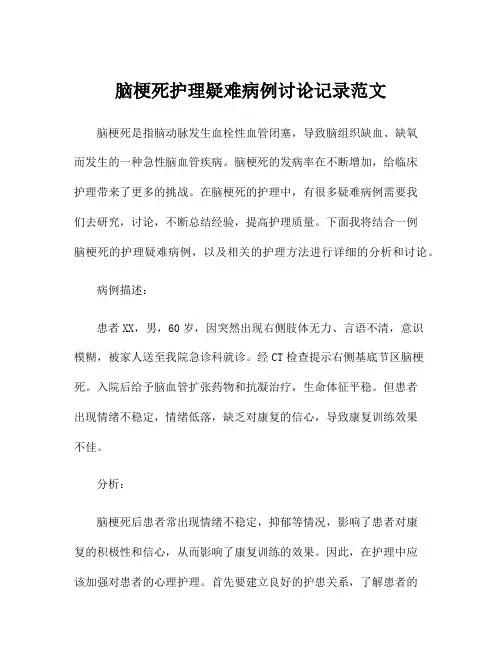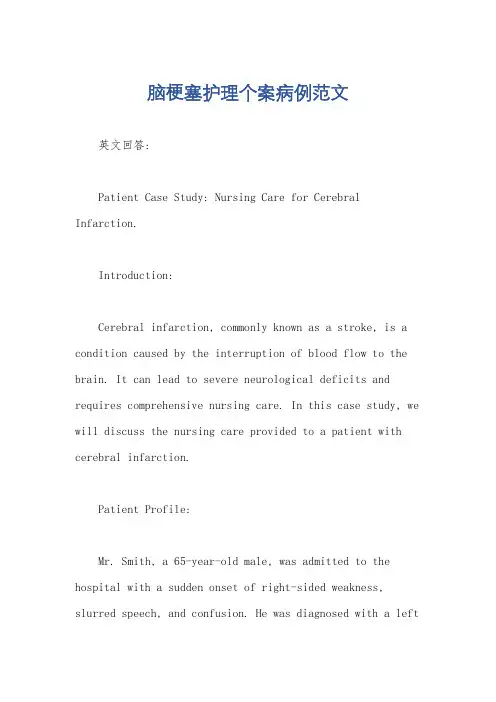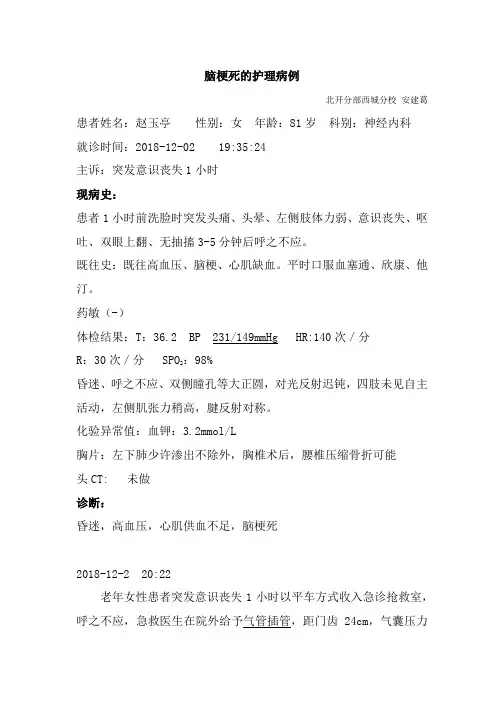脑梗塞病人护理_病例
- 格式:ppt
- 大小:751.50 KB
- 文档页数:16




脑梗死护理疑难病例讨论记录范文脑梗死是指脑动脉发生血栓性血管闭塞,导致脑组织缺血、缺氧而发生的一种急性脑血管疾病。
脑梗死的发病率在不断增加,给临床护理带来了更多的挑战。
在脑梗死的护理中,有很多疑难病例需要我们去研究,讨论,不断总结经验,提高护理质量。
下面我将结合一例脑梗死的护理疑难病例,以及相关的护理方法进行详细的分析和讨论。
病例描述:患者XX,男,60岁,因突然出现右侧肢体无力、言语不清,意识模糊,被家人送至我院急诊科就诊。
经CT检查提示右侧基底节区脑梗死。
入院后给予脑血管扩张药物和抗凝治疗,生命体征平稳。
但患者出现情绪不稳定,情绪低落,缺乏对康复的信心,导致康复训练效果不佳。
分析:脑梗死后患者常出现情绪不稳定,抑郁等情况,影响了患者对康复的积极性和信心,从而影响了康复训练的效果。
因此,在护理中应该加强对患者的心理护理。
首先要建立良好的护患关系,了解患者的内心想法和情绪变化,有针对性地进行心理干预和咨询,帮助患者重新树立对康复的信心。
护理方法:1.与患者建立良好的护患关系:护士要通过耐心倾听,细致入微的护理质量,让患者感受到关爱和关心,建立起患者对护士的信任和依赖,使患者敞开心扉,愿意与护士沟通交流。
2.了解患者的内心想法和情绪变化:护士要通过观察和与患者的交流,了解患者的内心想法和情绪变化,及时发现患者的心理问题。
3.有针对性的心理干预和咨询:护士要根据患者的情况,有针对性地进行心理干预和咨询,对患者进行心理抚慰和鼓励,帮助患者建立健康的心态。
4.帮助患者重新树立对康复的信心:护士要与患者进行深入的沟通,帮助患者了解疾病的发展和康复的重要性,引导患者树立对康复的信心,积极配合治疗。
结论:脑梗死患者的康复与护理是一个复杂的过程,既要重视身体的治疗,也要关注患者的心理健康。
在护理中,要加强对患者的心理护理,建立良好的护患关系,了解患者的内心想法和情绪变化,有针对性地进行心理干预和咨询,帮助患者重新树立对康复的信心,以提高康复训练的效果。





脑梗塞护理个案病例范文英文回答:Patient Case Study: Nursing Care for Cerebral Infarction.Introduction:Cerebral infarction, commonly known as a stroke, is a condition caused by the interruption of blood flow to the brain. It can lead to severe neurological deficits and requires comprehensive nursing care. In this case study, we will discuss the nursing care provided to a patient with cerebral infarction.Patient Profile:Mr. Smith, a 65-year-old male, was admitted to the hospital with a sudden onset of right-sided weakness, slurred speech, and confusion. He was diagnosed with a leftmiddle cerebral artery infarction. Mr. Smith has a medical history of hypertension and hyperlipidemia.Assessment:Upon admission, Mr. Smith's vital signs were stable, but he had a decreased level of consciousness. His Glasgow Coma Scale (GCS) score was 11, indicating a moderate level of consciousness impairment. Neurological assessment revealed right-sided hemiparesis and aphasia. The patient's blood pressure was elevated at 160/90 mmHg, and his heart rate was 82 beats per minute.Nursing Interventions:1. Monitoring vital signs: Regular monitoring of blood pressure, heart rate, respiratory rate, and temperature is essential to detect any changes or complications. It is important to keep the blood pressure within the target range to prevent further damage to the brain.2. Neurological assessment: Frequent neurologicalassessments, including motor and sensory functions, level of consciousness, and pupillary response, are necessary to evaluate the patient's progress and detect any deterioration. Assessing speech and language abilities is crucial for patients with aphasia.3. Positioning and mobility: Proper positioning and turning every two hours are essential to prevent complications such as pressure ulcers and respiratory infections. Active and passive range of motion exercises should be performed to prevent muscle contractures and maintain joint flexibility.4. Dysphagia management: As Mr. Smith has difficulty swallowing due to aphasia, a speech therapist should be consulted to assess the patient's swallowing ability and recommend appropriate dietary modifications or feeding techniques. Close monitoring during meals is necessary to prevent aspiration.5. Medication administration: Administering prescribed medications promptly, including antiplatelet agents,antihypertensives, and lipid-lowering drugs, is crucial to prevent further complications and manage underlying conditions.6. Education and support: Providing education to the patient and family members about stroke prevention, medication compliance, and the importance of a healthy lifestyle is vital. Emotional support and counseling should be offered to help the patient cope with the physical and psychological impact of the stroke.Conclusion:Cerebral infarction requires comprehensive nursing care to promote recovery and prevent complications. Regular monitoring of vital signs, neurological assessments, proper positioning, dysphagia management, medication administration, and patient education are essential components of nursing care for patients with cerebral infarction.中文回答:个案病例,脑梗塞护理。


脑梗死的护理病例北开分部西城分校安建葛患者姓名:赵玉亭性别:女年龄:81岁科别:神经内科就诊时间:2018-12-02 19:35:24主诉:突发意识丧失1小时现病史:患者1小时前洗脸时突发头痛、头晕、左侧肢体力弱、意识丧失、呕吐、双眼上翻、无抽搐3-5分钟后呼之不应。
既往史:既往高血压、脑梗、心肌缺血。
平时口服血塞通、欣康、他汀。
药敏(-)体检结果:T:36.2 BP 231/149mmHg HR:140次/分R:30次/分 SPO2:98%昏迷、呼之不应、双侧瞳孔等大正圆,对光反射迟钝,四肢未见自主活动,左侧肌张力稍高,腱反射对称。
化验异常值:血钾:3.2mmol/L胸片:左下肺少许渗出不除外,胸椎术后,腰椎压缩骨折可能头CT: 未做诊断:昏迷,高血压,心肌供血不足,脑梗死2018-12-2 20:22老年女性患者突发意识丧失1小时以平车方式收入急诊抢救室,呼之不应,急救医生在院外给予气管插管,距门齿24cm,气囊压力30cmH2O,有创呼吸机辅助通气,模式:SIMV+VCV+PSV,呼吸频率:20次/分潮气量:400ml,压力支持:18cmH2O 呼气末正压:6cmH2O 吸入氧浓度100%心电监护:R:15次/分 BP:231/149 P:23次/分 SPO2:65%持续胸外按压血气分析:PH:6.99 PCO2:83mmHg po2:71mmHg Lac:6.3mmol/L SPO2:82%药物治疗:盐酸肾上腺素1mg iv ✖2支5%碳酸氢钠125ml ivgtt20:50 BP 34/24mmHg盐酸多巴胺20mg iv0.9%盐水100ml+盐酸多巴胺360mg/18ml/hr5%葡萄糖100ml+去甲肾上腺素6mg/4ml/hr万汶500ml ivgtt22:00 血气分析:PH:7.54 Pco2:27mmHg Po2:225mmHg Lac:3.2mmol/L SO2C:100% 将呼吸机吸入氧浓度减至50%2018 -12-3 4;00心电监护:R:20次/分 P:118次/分 BP141/78mmHgSPO2:100主要护理问题:一、气管插管的固定:两根胶布固定,一根胶布缠绕气管插管交叉黏贴在口唇周围,另一根胶布缠绕一圈口塞再缠绕口塞和气管插管后交叉黏贴在口唇周围。